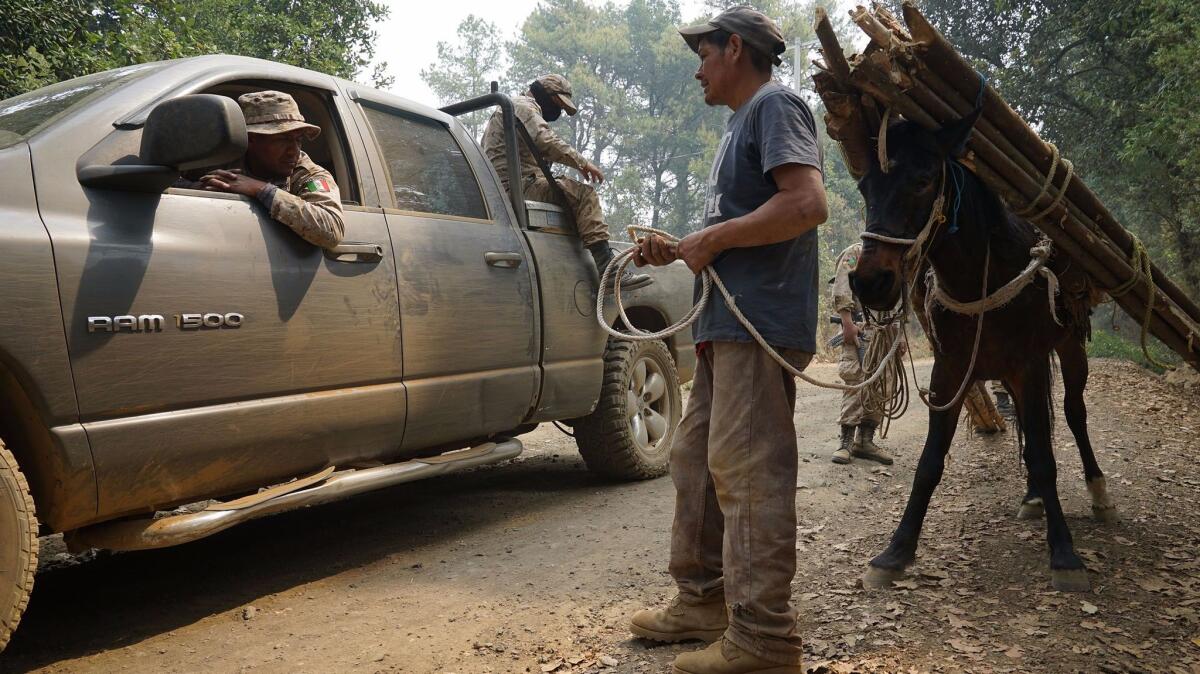She fought back against illegal loggers. Now she’s been found strangled on a highway in Mexico

Reporting from Mexico City — Like many residents of the pine-covered hills of Cheran in central Mexico, Guadalupe Campanur led a life of radical resistance.
As a young woman in 2011, she joined town leaders in fighting back against illegal loggers and drug traffickers accused of murdering local farmers.
She later played a role when the town’s newly formed self-defense patrols expelled the local government that was perceived as corrupt. They replaced police officers and politicians aligned with national parties with homegrown militias and assemblies inspired by the community’s indigenous roots.
Fellow activists say Campanur, 32, was deeply committed to the town’s unique political and social experiment, leading patrols of the militia as well as community sewing classes.
Last week, she was found strangled on the side of a highway.
Was Campanur’s death connected to her activism? Environmental activists have been killed in Mexico and countries across the globe in recent years. Was it the result of a personal conflict? Or was she just another of the 80 homicide victims killed daily across Mexico, a country where increasingly balkanized criminal groups have fueled a historic surge of violence?
ENVIRONMENTAL WARRIORS: Defending the planet has become a suicide mission »
Whatever happened, the incident is a profound loss for a close-knit community that has proudly sought to insulate itself from the violence of the rest of the country, said Pedro Chavez, a teacher and Cheran community leader.
“We have maintained our struggle to confront this situation of insecurity, and the death of a member of our community hurts us deeply,” Chavez said.
“Guadalupe had a dedication, like the majority of the population here, to defend our community,” he said. “She was a comrade.”
Michoacan Gov. Silvano Aureoles said that although authorities have not yet identified any suspects, the slaying “will not go unpunished.” The state attorney general’s office said relatives of Campanur said they were unaware of threats against the woman.
Campanur’s body was found near a highway about 20 miles north of Cheran, in the town of Chilchota.
The state of Michoacan, where Cheran and Chilchota are located, is one of Mexico’s most violent places, with 1,510 homicide investigations opened there last year. In some regions, criminal gangs operate with near impunity.
Traveling by automobile is notoriously unsafe, and road closures organized by criminals — so-called narco-blockades — are frequent. Earlier this month, the U.S. State Department issued a warning urging American citizens not to visit the state.
Cheran, on the other hand, has been a haven since the community takeover.
A heavily protected bastion where local militia members guard each main entrance to town, authorities say there has not been a murder there since the takeover in 2011. The town runs a regular forest patrol, with locals armed with assault rifles fanning out across the woods looking in search of illegal loggers.
Political electioneering is banned — no one can enter the town with so much as a bumper sticker promoting a political party — because of the link between political parties and criminal gangs that operate in the area, town leaders say.
Because Cheran’s residents mostly belong to the Purepecha Indian ethnic group, they were allowed to set up their own government under Mexican laws governing indigenous areas. Still, it took a lengthy court fight for the town to be able to implement its own system of government.
Chavez said that after Campanur’s death, the local assemblies and the militias have stepped up security in the region.
To read the article in Spanish, click here
Twitter: @katelinthicum
Twitter: @PmcdonnellLAT
Cecilia Sanchez of the Times’ Mexico City bureau contributed to this report.
More to Read
Sign up for Essential California
The most important California stories and recommendations in your inbox every morning.
You may occasionally receive promotional content from the Los Angeles Times.










